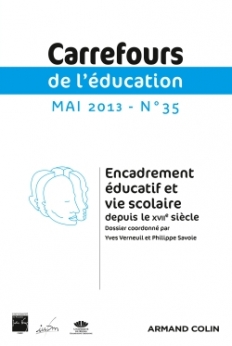
Carrefours de l'éducation n° 35 (1/2013)
Numéro épuisé
Recevez les numéros de l'année en cours et accédez à l'intégralité des articles en ligne.
De la Libération à 1981, les syndicats de la FEN du second degré, le syndicat national de l’enseignement secondaire (SNES) en particulier, ont défendu l’existence d’une catégorie d’étudiants-surveillants, les maîtres d’internat (MI) et surveillants d’externat (SE), dont les statuts avaient été élaborés ou rajeunis en 1937 et 1938. Attaché à la qualité de la transmission de contenus d’enseignement et à la démocratisation du recrutement des professeurs, le SNES s’est constamment opposé à la création d’une catégorie pérenne d’animateurs-éducateurs. Pourtant, à partir de 1968, reprenant des pistes explorées peu après la Libération, il a cherché à définir une doctrine neuve de la surveillance mettant l’accent sur son rôle éducatif. Cette tentative n’aboutit pas réellement pour un ensemble de raisons : désintérêt grandissant des étudiants-surveillants pour la profession enseignante – dont la surveillance avait longtemps été une sorte d’antichambre pour les étudiants d’origine sociale modeste –, remise en cause des notions anciennes de l’autorité entre élèves et adultes, diminution constante du nombre des postes de surveillants allant de pair avec la baisse du taux de syndicalisation… sans compter les enjeux de pouvoir entre les syndicats de la fédération et ses tendances organisées.
From 1945 to 1981, the unions from the FEN (Fédération de l’éducation nationale or State school system federation) representing secondary school personnel, and in particular the SNES (Syndicat national des enseignements de second degré or National secondary school union), defended the existence of a kind of student cum educational supervisor, as either maître d’internat (boarder supervisor) (MI) or surveillant d’externat (day-pupil supervisor) (SE), whose job definitions and statuses had been elaborated or modernised in 1937 and 1938. The SNES, committed to defending the quality of the transmission of knowledge as well as the democratisation of professor recruitment, refused the creation of a permanent category of facilitator- supervisor. Nonetheless, starting in 1968, and going back in this to ideas first explored just after the war, the union started elaborating a new policy regarding the supervisory function in schools, emphasising its educational aspect. This did not go anywhere, for a number of reasons: student-supervisors showed decreasing interest in the teaching profession – for which supervising had long been a kind of antechamber, used by students of modest social origins --, changes in the concepts of authority between pupils and adults, constant decrease in the number of supervisors as well as in the number of them belonging to a union… not to mention the power struggle between the unions belonging to the Fédération and its currents.